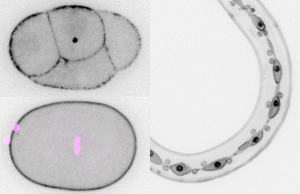PhD position: How does cell identity contribute to division in animal cells?
Posted by Tim Davies, on 10 May 2021
Location: Durham, UK
Closing Date: 30 May 2021
Cell division is fundamental to life and errors can result in abnormal chromosomal numbers, developmental defects, and cancers. Similarities in the structural and molecular organization of the division apparatus gives the textbook picture, that mechanisms underlying division, including formation and constriction of an actomyosin contractile ring, do not vary between cell and organism types. However, recent research and clinical findings suggest that there is a previously un-appreciated variation in the molecular requirement for cytokinesis to occur, as depletion or mutation of several ‘essential’ proteins only disrupt division in specific cell-types and lineages.
During C. elegans development each cell has a specific identity and gives rise to different cell lineages. Furthermore, the factors that control cell identity (including cell-signalling, 3D-environment, lineage and fate) have been well mapped by decades of detailed developmental biology. Therefore, it is an excellent multicellular system for observing the interaction between cell identity and cytokinetic perturbation in genetically identical, but functionally variable cells.
This PhD project will use the C. elegans model system, observing division in embryonic and larval cells. State of the art confocal microscopy will be used to image cytokinesis, tracking the outcome of this rapid and dynamic cellular process, and quantifying localisation of fluorescently labelled cytokinetic proteins, while perturbing different aspects of cell identity (such as cell polarity and cell-signaling).
The student will be trained in live-cell fluorescence microscopy and image analysis, as well as general molecular and cell biology techniques and C. elegans genetics and transgenesis (via MosSCI and CRISPR). They will be given opportunities to present their work Departmental seminars, as well as external conferences and will take part in lab meetings and journal clubs within the ’Animal Cells and Systems’ division of the Department of Biosciences.
If you have any questions or would like to discuss the project, please contact the supervisor (Dr Tim Davies – timothy.r.davies@durham.ac.uk). To apply, email a CV and covering letter, detailing reasons for applying to the supervisor by 30th May 2021. Reference letters and further information will not be required until after shortlisting.
Funding Notes
References
Closing Date: 30 May 2021
Scientific fields: Cell biology, Development and disease, Early embryogenesis
Model systems: C. elegans
Duration: Permanent


